SCDP’s Christmas Potpourri: A 2 Million Dollar Gift. A Party Dilemma. A Troubled Don Draper.
Article first published as Mad Men Christmas: Reality Bites on Blogcritics.
The first episode of season four gave us a glimpse into the beginnings of a new advertising agency with a familiar cast of characters and a few new faces. Sterling Cooper Draper Pryce seems to be off to an acceptable but not spectacular debut. While starting a new ad agency might have been relatively easy, building a successful, enduring agency was far from a walk in the park. The need to do whatever it takes to keep the doors 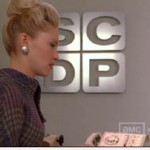 open while showcasing and enhancing the agency’s creative reputation was, and still is, the essential driving force in building an agency. Bert reminded everyone how fragile this can be when he announced that one client, Lucky Strike, accounted for 71% of the agency’s revenue. While it was not unusual for an ad agency’s fortunes to be in the hands of one, two, or perhaps three clients, this level of dominance was particularly troubling…and it was with a client that was coming under increased regulatory pressure.
open while showcasing and enhancing the agency’s creative reputation was, and still is, the essential driving force in building an agency. Bert reminded everyone how fragile this can be when he announced that one client, Lucky Strike, accounted for 71% of the agency’s revenue. While it was not unusual for an ad agency’s fortunes to be in the hands of one, two, or perhaps three clients, this level of dominance was particularly troubling…and it was with a client that was coming under increased regulatory pressure.
Don’s New Reality
The struggle to get new clients and the urgent need to keep the existing ones happy was very real and it put new pressures on everyone. Additionally, these high powered Mad Men were now operating in a radically different environment than Sterling Cooper. The agency was much smaller, with fewer resources, leaner expense accounts, a compacted hierarchy, and dependent on codependent relationships. 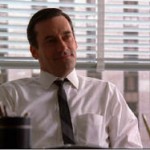 Leadership, visible, talked about work, risk taking and creative reputation mattered more than ever. At a critical moment Don rose to the occasion. He decided to step up and step out by declaring himself the “voice” and personification of Sterling Cooper Draper Pryce. Don’s move created a new level of expectations by which he would be judged (by himself and others) and it set the stage for a whole net set of office dynamics and politics. Here’s how some of this played out in episode two.
Leadership, visible, talked about work, risk taking and creative reputation mattered more than ever. At a critical moment Don rose to the occasion. He decided to step up and step out by declaring himself the “voice” and personification of Sterling Cooper Draper Pryce. Don’s move created a new level of expectations by which he would be judged (by himself and others) and it set the stage for a whole net set of office dynamics and politics. Here’s how some of this played out in episode two.
A New Client With Some Strings Attached
There is a truism in the agency business. Clients hire agencies but the business is built on the relationships with the people that do the work and 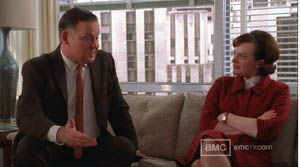 deliver the goods. Sometimes these people relationships become more important than the agency. When key people change jobs or strike out on their own clients occasionally will move with them. While this still happens today, it was more prevalent in the Mad Men days. The Freddy Rumsen, Ponds cold cream scenario that unfolded in this episode is revealing in a few ways. When Freddy dangled the two million dollar Ponds account in front of Roger Sterling he was welcomed back to the new agency as a reformed man. But, he had some very specific conditions. No Pete Campbell as the account person (payback time), he would be the creative front man, and he wanted to work with Peggy. Given the agency’s tight financial conditions, money trumped loyalty
deliver the goods. Sometimes these people relationships become more important than the agency. When key people change jobs or strike out on their own clients occasionally will move with them. While this still happens today, it was more prevalent in the Mad Men days. The Freddy Rumsen, Ponds cold cream scenario that unfolded in this episode is revealing in a few ways. When Freddy dangled the two million dollar Ponds account in front of Roger Sterling he was welcomed back to the new agency as a reformed man. But, he had some very specific conditions. No Pete Campbell as the account person (payback time), he would be the creative front man, and he wanted to work with Peggy. Given the agency’s tight financial conditions, money trumped loyalty
The dynamic between Freddy and Peggy is interesting. Peggy is passionate about doing great creative work that will get the agency noticed. She also knows that Freddy is a “hack” (she called him old fashioned) and that he would only push the work he knew the client would buy. All the rest would be window dressing. So much for creative reputation building. Hopefully we will get to see the campaign they develop and sell.
Enter The Shrinks
The Mad Men days also saw the beginning of a new creative wave in advertising. Fact heavy, demonstration driven, before and after advertising was beginning to give way to softer, more emotionally driven approaches. To better address these needs agencies started to employ motivational research as part of their creative development process. Initially, most of the creative people viewed this with great 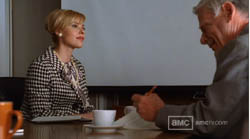 skepticism and saw it as a distraction. The conference room scene in which Dr. Faye Miller introduced these new techniques to the agency team captured the attitude and dynamic brilliantly. Many of the researchers in this field were women and they had to work very hard just to command the attention of advertising’s macho boys club. Also, their research was based on “touchy feely” findings and attitudes that the Don Drapers of the business simply could not grasp or relate to. It was an uphill battle and Don’s abrupt exit summed it up well. I don’t think we’ve seen the last of Dr. Miller.
skepticism and saw it as a distraction. The conference room scene in which Dr. Faye Miller introduced these new techniques to the agency team captured the attitude and dynamic brilliantly. Many of the researchers in this field were women and they had to work very hard just to command the attention of advertising’s macho boys club. Also, their research was based on “touchy feely” findings and attitudes that the Don Drapers of the business simply could not grasp or relate to. It was an uphill battle and Don’s abrupt exit summed it up well. I don’t think we’ve seen the last of Dr. Miller.
The Ups And Downs Of Christmas
The Christmas holidays were hectic and demanding in the agency business. There usually was a heavy workload leading up to the holidays that 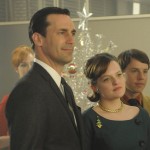 had to be balanced with the obligations of client entertainment and attention. It was expected. Christmas parties definitely were the highlight of the year…not only at the agencies but also with the vast array of media companies, printers, production houses, and other suppliers who courted agencies for their business. Some of these outside parties were legendary for their extravagance and wild and crazy times. We had clients that would plan an entire holiday week around attending them and it was the responsibility of the account team to make sure that every base and expense was covered.
had to be balanced with the obligations of client entertainment and attention. It was expected. Christmas parties definitely were the highlight of the year…not only at the agencies but also with the vast array of media companies, printers, production houses, and other suppliers who courted agencies for their business. Some of these outside parties were legendary for their extravagance and wild and crazy times. We had clients that would plan an entire holiday week around attending them and it was the responsibility of the account team to make sure that every base and expense was covered.
Keep It In The Family
Most agencies preferred to do their client holiday entertaining at private lunches and dinners where they could spend some quality, relationship-building time. Agency parties were more like internal family affairs, each with their own style and tradition. We let our hair down, celebrated, and got to know each other better. When times were good the parties were bigger. When times were lean they were scaled back. But there was always a party. We tried to avoid having clients at office Christmas celebrations for some good reasons. The prospect of multiple, socially lubricated clients gathered in one place comparing notes about the agency was a risky recipe. There was always the possibility of embarrassing and potentially relationship-ending incidents. Expectations were higher so it cost more. And, it also meant that the key agency management would be taking care of clients rather than celebrating the agency and its people.
 This was cleverly brought to life at Sterling Cooper Draper Pryce when the Lucky Strike client (Mr. 71% of the agency’s business) announced he was in town, wanted to attend the agency’s party and was expecting a Madison Avenue great time. Suddenly, Roger had to up the ante for the party and “change the rating from convalescent home to Roman orgy.” He was also subjected to a lecture from Lane about the importance of controlling expenses and reining in his “bottomless pocket of money” management style. Then, the client forced Roger into donning the Santa Claus suit and took pictures with staffers sitting on his lap. Ho! Ho! Ho! Humiliating.
This was cleverly brought to life at Sterling Cooper Draper Pryce when the Lucky Strike client (Mr. 71% of the agency’s business) announced he was in town, wanted to attend the agency’s party and was expecting a Madison Avenue great time. Suddenly, Roger had to up the ante for the party and “change the rating from convalescent home to Roman orgy.” He was also subjected to a lecture from Lane about the importance of controlling expenses and reining in his “bottomless pocket of money” management style. Then, the client forced Roger into donning the Santa Claus suit and took pictures with staffers sitting on his lap. Ho! Ho! Ho! Humiliating.
The next day Roger met Don at the office and made this classic statement that summed up his attitude about the party. “ My father used to say that this is the greatest job in the world except for one thing — the clients.”
Clients. Without them there wouldn’t be any Mad Men.
